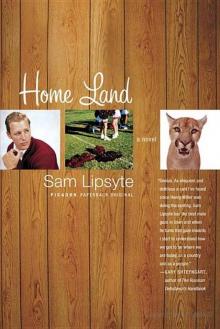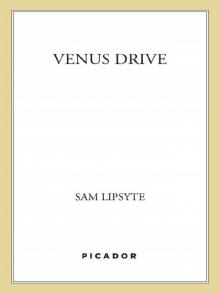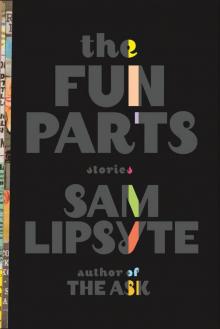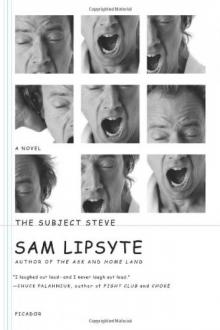- Home
- Sam Lipsyte
Venus Drive
Venus Drive Read online
In Memory of My Mother
Contents
Old Soul
Cremains
The Morgue Rollers
I’m Slavering
Admiral of the Swiss Navy
Ergo, Ice Pick
Beautiful Game
The Drury Girl
Probe to the Negative
The Wrong Arm
My Life, for Promotional Use Only
Torquemada
Less Tar
Preview
Old Soul
You could touch for a couple of bucks. The window of the booth went up and you stuck out the bills. They might tell you not to pinch, but I was a stroke type anyway. Some guys, I guess they want to leave a mark. Me, I just like the feel.
I went over there on the way to see my sister. There was a lit-up eye with an eyebrow over the door, a guy in front with a change belt, an apron that said Peep City. Peeptown was up the block. They didn’t have an eyebrow over the eye over there.
Why do they make these places so dark? I like to cop tit in the light. Guess I have no shame. Maybe I got through shame a long time ago. Somebody said I had an old soul, which I took to mean I’m older than I am, or that I’ve been places I haven’t been.
You could hardly see in there, in Peep City, and all that disco, that ammonia, it made me sick. I looked around for a girl with a good set, one who would maybe tell me I was sweet. Sometimes they asked about handjobs, blowjobs, all the jobs, but I never wanted to go that far. I felt sorry for them. Somebody told me they were exploited. Me, I always paid in full.
This time, just to break habit, I went for what one of them had down below, a few bucks more. She was a giant with plenty on the chest, but I put a fivespot out. She swiveled on the ledge, pushed an ass dusted with glitter out over the sill. I palmed her there, thumbed a pimple near the crack. What am I paying for this for? I thought, thumbing it.
The giant was talking to another girl pressed against her on the ledge. The other girl was a sway of hair that moved like a metronome. The sway took on the color of the strobes.
“What’s he doing down there?” said the other girl.
“Jeez, nothing,” said the giant.
I dug a knuckle in.
“What the fuck,” the giant said. The blind was buzzing shut.
“Prick,” she said.
There was a bucket near the door with soapy water in it. I got down like you do for a shoelace, dipped my knuckle in the bucket. The man in the apron came up.
“I got ass germs on it,” I said.
I figured it was Peeptown from now on.
There were still a few hours before my sister’s visiting hours were over, so I went to visit a friend. This was the guy who explained to me how the girls in Peep City were exploited. The ones in Peeptown, too. He worked the graveyard in the shipping room of a superstore. Another year, he told me, and they might let him come upstairs. He worked mornings in his apartment, stuffing envelopes, selling pot. A guy like that, you hope he has a secret calling, or maybe a guitar. But Gary just wanted to live. Or maybe he thought he wanted to be free. Some do.
When I got there Gary loaded up a pipe and passed it over. I told him all about Peep City, the pimple, the girl.
“You should stay away from that place,” said Gary.
“I don’t have much choice now,” I said.
“All those places, man. Your soul is sick.”
“I thought you said I had an old soul,” I said. “Now it’s sick.”
“It’s an old sick fuck,” said Gary. “Go see your sister. You’re going to be sorry you didn’t see her.”
“I’ve got time,” I said.
Time stops, goes, stops again. When you have an old soul like I do, everything gets old really quick. Nothing is new. An avocado, a glass of beer, it all tastes like it’s been sitting out on a table too long.
Gary fell unconscious from all his freedom. I found happy hour somewhere. I knew the bartender, a brush cut from the big one. He was German, the other side. All he had now were a few shelves of New Jersey vodka and a thing about the Jews. I let him rant. I figured with a soul as old as mine, maybe I fragged his brother at the Bulge.
“I’m an old soul,” I told him.
“Oslo? Fuck it.”
“Not Oslo,” I said.
“No souls,” he said. “Fuck it. Norway, too. Odin is a yid.”
A girl in a tank top got up in my lap. She didn’t smell, but her shoulders, her hair, they had a dirt sleep shine.
“You look like that rock star,” she said. “Do you get high?”
“I am high,” I said.
“No, I mean high.”
“Oh,” I said. “Sometimes.”
“You’re buying,” she said.
We went someplace, her place, her boyfriend’s, her mother’s, who could tell? You can’t tell from a sofa. Or a couch. You can’t tell from a coffee table, or a cross on the wall. She took what we bought and locked herself in the bathroom. I was on old soul time. I lost track of bathroom time.
“Sandy?” I said. She’d know who I meant.
I was getting ready to break down the door. I was getting ready to be the guy who has to tell the whole story to the police, and maybe get punched by them for being the guy who was there on the sofa, the couch. The door opened and Sandy came out, clean and wilted in a towel. Her hair smelled of honey, or hibiscus, one of those. Her eyes were pinned and she handed me a bag, some works.
“There’s bleach in there,” she said.
“No, thanks,” I said. “I just want to take a leak.”
I stood over the bowl but I couldn’t get flow. When I lie about having to take a piss, I can’t piss. I stared at the wallpaper, woodpeckers. On the beaks, or on the breasts of some of them, and on the leaves of trees, was a fine red spray. It was on the rim of the bowl, the tiles, too.
I went back to what I was sitting on and sat with her.
“I guess I should blow you,” she said.
“I have to go,” I said.
“Don’t leave.”
“You can keep what we bought,” I said.
“You’re nice.”
“I’m sweet,” I put my hand in her tank top, on whatever her habit hadn’t eaten off. “Aren’t I sweet?”
“You’re sweet,” she said.
“I have an old soul,” I told her.
“What do you mean?”
“I’m advanced,” I said.
“I’m intermediate,” she said. “I got a badge in camp.”
I took a train uptown to where they were tending to my sister. There’s a whole block of enormous buildings for people who are running out of luck. My sister was in the Someone-Someone Pavilion. Ventilator, feeding tube, they had everything in her to keep her from going anywhere.
There was a guy in the room I knew from somewhere. High school. Homeroom. Guess he had a name with the same first letter as mine. I once caught him with his finger in my sister under the Ping-Pong table. When he saw me that time he pulled his finger out. Don’t be a schmuck, I told him, finish up. Now he had his hands on his knees, a book in his lap.
“Good thing you came,” he said.
“How is she?” I asked.
Close to the bed, I saw what a dumb question it was. My sister used to be pretty for her type. She was still pretty, if you like girls who are skulls with a little skin on them, a few strands of cotton for hair. It was hard to believe she was going to live another minute. It had been months this way. I wanted to get in the bed, hold her, but I thought I might knock a tube out.
“Do you mind?” I said to Homeroom.
I locked the door and sat on the chair, the book. It was something about a process, a grief process. I guess the guy had been boning up.
“Hey, you,
” I said. My sister did a snort through her air mask, this noise like everything that had always been my sister was clotted and wet inside her and we might need a tool to scoop it out. I gathered up the covers, slipped my hand under her gown. I knuckled in down there. Her knees opened in her sleep. Her nipple went up. I pushed the tubes off, bit down.
“Hey, you,” I said, into my teeth.
Sometimes when I tell this story to people, I say my sister opened her eyes for a moment and our souls touched, my old soul and her pretty much dead one. I hope they don’t believe it. My sister died a few hours later, but I was far away. I went to Peeptown. The place had really gone downhill. Then I found Gary and we went to the Jew-hater’s bar. Gary had a bump nose and took the German’s theories badly. Gary, I said, shut up and get a guitar. This place needed strummy music and maybe the hate would go away. I’d seen it happen, in other lives. Sandy was there, loaded, doing lap hustles for the dream of a bundle. Turned out Sandy was the bartender’s daughter. Deirdre was her true name. We were together for years and years, here and there. I’m sure she was a whore in the time of Bismarck.
Her soul is older than mine.
Cremains
Here’s Hilda with the big blind eyes. She hands me a letter on the landing.
“Can you read this to me?” says Hilda. “Can you say what it says?”
These old ladies, they stream out of their doorways in the mornings, they come stunned-looking to the hallway in their straw shoes. They stand around and wave me over. I’m the only able-bodied homebody here. The Super lives across the river and all the husbands are dead. The old ladies wave me over to do their dirty work. They must think I don’t have any other kind, or maybe they figure I owe it to them to help. Not too long ago my mother was alive here among them, the youngest of the young of them by years. Now it’s just me and the morphine my mother left in the morphine drawer. I haven’t been down to the old streets in months. Once you’ve tasted the bounty of the pharmacy, who wants bad counts and bad people again?
“Tell me what it says,” says Hilda.
“Rent is going up,” I say, slap her phone bill in my palm. “Forty more bucks a month. Or you’re out.”
“Bastards,” she says. “To an old blind lady.”
“The times we live in,” I say.
“We don’t live in any times,” says Hilda. “I hope I die soon. Will you read the paper to me?”
“Not today, Hilda.”
“Your mother was a saint. She read the paper to me every day.”
“How can she be a saint?” I say.
“Not that kind,” says Hilda. “Why can’t I just die?”
Hilda has a little fuzzy skull with lots of veinwork. It wouldn’t take very much in the way of force to grant her this wish. It would be an act of mercy, maybe. I could go around to every door, ask who wants the service. I’d be a hero to some, to others just another doper with an old lady peeve. The newspaper Hilda gets delivered would call me evil. The one I buy on the corner would say it’s more complicated than that.
I do lightbulbs for Mrs. Lizzari. She must run her lights all night. They say there’s some kind of minuscule chance the whole thing will explode in your face, so I always turn away on the last twist. Don’t mess with the minuscule, I say.
“Thank you, dear,” says Mrs. Lizzari. “I can’t get up on the chair like that anymore.”
“No problem,” I say.
“Don’t hurt yourself.”
“I won’t.”
“Be careful.”
“I am.”
There’s some prison flick I saw where the cons rig the lights to fry a stoolie. It’s just a flash, then he falls to his knees, his spine in a volted stutter. It always stuck with me, the way something does when you think it might pertain to you, a lesson to your kind.
“Do you want a cookie?” says Mrs. Lizzari.
“Thanks,” I say.
“I brought these to your mother when she was in the hospital.”
“These?”
“No, not these in particular. Cookies.”
“Right.”
“I took the bus there by myself. I didn’t see you there.”
“I was there.”
“Well, not on that particular day.”
I get down from the chair, chew my cookie.
“I saw Hilda this morning,” I say.
“A sad case,” says Mrs. Lizzari. “A sad case of a woman.”
“She said she wants to die,” I say.
“That’s the oldest one in the book,” says Mrs. Lizzari. “That’s older than the book. And I know your mother taught you to keep your mouth shut to be eating a cookie.”
My place is still pretty much my mother’s place. I mean I haven’t really moved any stuff around. I put up some postcards from my old girlfriend on the refrigerator, but that’s about it. One of them is of a lobster, reads “Welcome to Idaho.” This is the kind of humor that used to tide us over until we were high enough to suck each other off. I’ve taped it up as a testament to what’s not really funny.
It’s a hell of a deal to get a place like this in a city like this for next to nothing. The trade-off is doilies on the arms of the flower-print couch. I tried to take them off, but they were still somehow there, so I had to put them on again. This is why I haven’t moved stuff around. It doesn’t help. Even empty, your mother’s apartment is your mother’s apartment.
You just have to adjust.
My old girlfriend came to visit, and I could see she was uneasy. She’d never even known my mother and here were all the family photos in those accordion frames—the trip to Rome, NY, that day in the zoo with the spitting llama, the cousin with custard on his shirt. Here were doilies and cork coasters and sugarless sugar in a crystal bowl. My mother was of the generation that tended to tear up those little pink packets and pour them together.
I’m trying to keep tradition alive.
I got my old girlfriend to fuck me in my mother’s bed, but we had to stop when she caught me watching us in my mother’s mirror. It’s a big mahogany-mounted thing with brushes and creams on the bureau beneath it. I could see everything in the mirror, the flush of us, the jimmying, and to keep from coming I tried to make out the labels on my mother’s lotion jars: Cocoa Essence, Hibiscus Morning, Goddess Balm. Then my old girlfriend hopped off of me.
“I can’t,” she said. “That mirror. Too spooky.”
“Fuck,” I said, went to the bureau for some cream.
The old ladies here don’t seem to understand. I may not have a job, but I work. I’m talking about dozens of projects well underway, with serious interest on both coasts, not to mention the midwestern markets. The ideas are tricky, though, so I have to make sure the times are right. That’s assuming Hilda was wrong, that we do, in fact, live in times.
Whatever Mrs. Lizzari thinks, I visited my mother a lot. There just wasn’t much to visit by the time I got on the scene. Lucky for me they had widescreen in the ward lounge. I restricted myself to several hours of television a day. You can get caught up in things, forget why you’re there. You’re supposed to be helping someone die, making it more reasonable with ice cream and gardening magazines. Next thing, you’re glued to some cable premiere, Who Were the Etruscans?, Captains of Vaccine.
The hospital also had an in-house station. My mother’s pain specialist had her own show. The episode on bone disease was great, though I can’t say that Tessa, that was her name, was a natural. She was a little stiff, which I liked when she stood near my mother’s bed in her dark dress with the lab coat on top, saying to my mother, “Let go, let go, let the angels take you now.”
It just didn’t work that well on TV.
When my mother started crying out for brands of candy bars they don’t make anymore, we knew we were near the end. We held hands around the bed and Tessa lowered her eyes, started to invoke the celestial escorts again. I could see that my father, my mother’s ex, had joined me in admiring throes apropos Tessa’s ass. My sister caught t
his, shot me one of those looks she has mastered over the years, the one that says, “You pig, you’re just like your pig father.”
Withering, I think they call it, though the word takes on new meaning if you’d seen my mother that day.
It was hard to believe this was the same woman who once sat me down on the flower-print couch, said, “When you were born, they put you in a bubble for a while. It wasn’t my decision. In those days the doctors were gods.”
Now they’re just priests, I guess, and my mother is maybe in a paradise of non-carcinogenic sugar substitutes, although her ashes, her cremains, as the undertaker called them, are tucked away in the linen closet. We can’t think of a place to scatter them. Places never had much meaning for my mother. She liked people and things.
Those last days in the hospital Tessa slipped me a pamphlet on grief management. I must have missed that episode on the in-house station. The pamphlet advised the griever to shower frequently and treat himself to a fancy meal. It didn’t mention doilies, but I may have an older edition.
It was also silent on the topic of the morphine drawer. My mother left a lot of dope behind. Also some syringes for the hormone she had to shoot. Her bones were doing a slow rot but she’d be damned if she got a habit. I guess I’m supposed to flush all these pills down the toilet now, but they tend to make my old-lady duties more bearable. Maybe it has something to do with my bubble days, but I’ve always needed something, just to do anything, or even to figure out what I need.
I promised my mother I would straighten out, but she was sort of in a coma. I don’t think it counts.
Today I’m doing Hilda’s dishes. I like to break one each time, so there’s one less to do the next.
“Oooh!” she says. “That sounded like a saucer.”
“Close,” I say.

 Home Land
Home Land Venus Drive
Venus Drive The Fun Parts
The Fun Parts The Ask
The Ask The Subject Steve: A Novel
The Subject Steve: A Novel